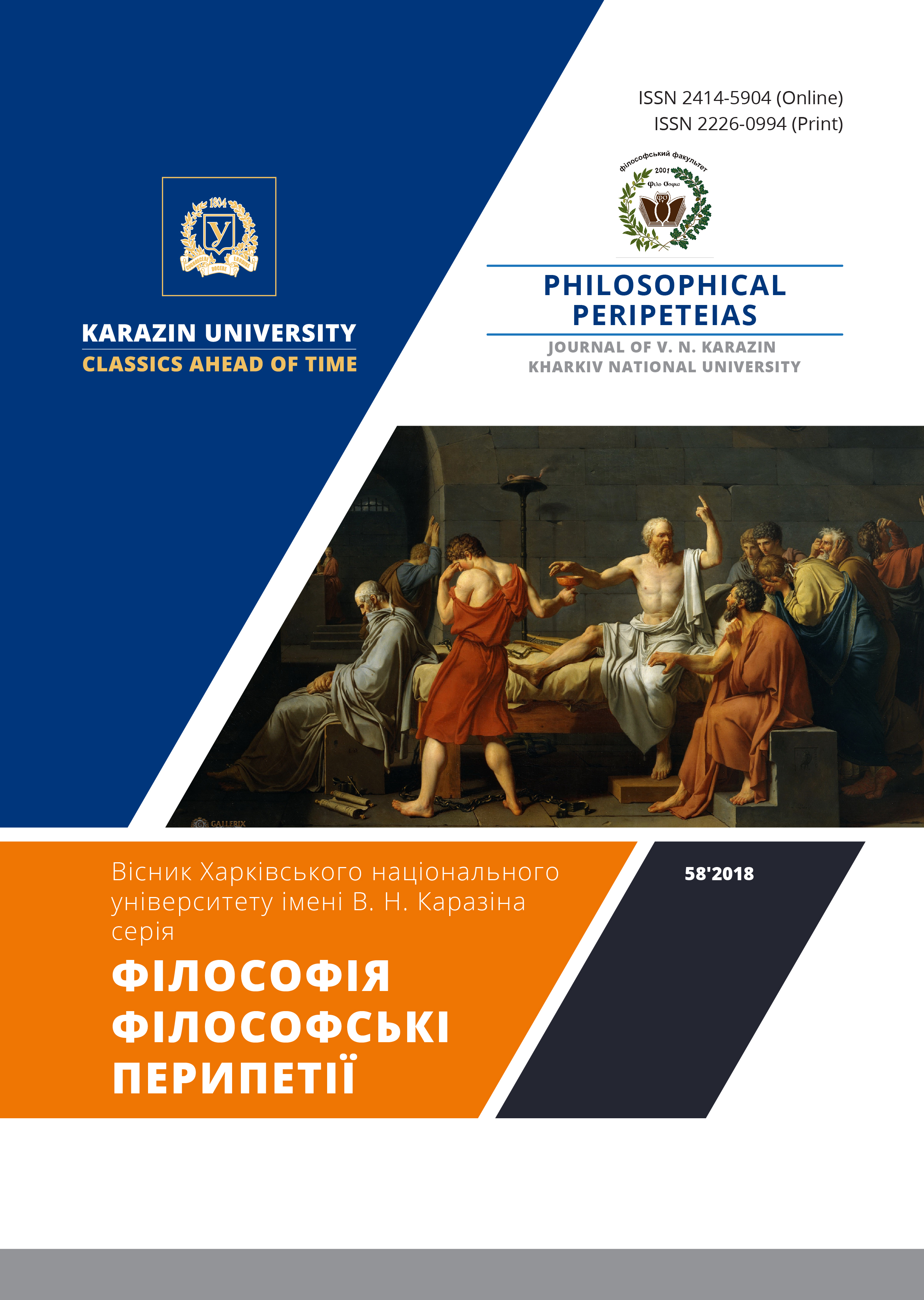DESTRUCTIVE AUTHORSHIP: ANTI-AUTHOR AND ANTI-GIFT
Abstract
The article deals with the question of the authorship and its nature in connection with the case of Herostratus. The main problem is forgotten creators of the temple of Artemis and the immortal fame of its arsonist. In this vein, the concept of destructive authorship is proposed as a form of displaying authorship based not on the usual act of creation, but on the opposite to it – an act of destruction. At the same time, a distinction has been made between “destructive authorship” as the realization of certain attributes of authorship using destruction as an instrument and its possible coup – “authorship of destructiveness” as a phenomenon based on autonomy and the priority of destruction in relation to authorship. Also, the concepts of “anti-author” and “anti-gift” are being developed, offered as oppositions to the classical notions of “author” and “gift”. Herostratus is represented as the central and featuring figure of certain cultural and historical narrative, which reaches the reverse side of “caring for oneself” through the act of destruction on the way to immortality. In this case, we are talking about the anti-author as an individualization through authorship without creation and focusing the individual on himself. For the story of Herostratus homeric question is impossible because the very nature of its situation is hypertrophy of the individual author’s being, which is incompatible with co-authorship. While not being created, it exists only as a desire to get author’s dividends, and therefore, as a desire to remain the only one. No less important is the question of the gift in the context of authorship, which is turned by Herostratus into a theft. If any authorship is inextricably connected with the gift, the destructive authorship contains an anti-gift – cultural theft (forcible appropriation) of the object or subject of the subject to destruction. It is the anti-gift allows the anti-author to realize himself not only as the one who commits the destructive act, but also the one who steals attention and memory, separating them from the previous carrier and acquiring it to himself. Thus, in the article on example of Herostratus is analyzed the development of the ideas logically parallel or contradictive to the established model of authorship based on the creative act with the proposal of the concepts which are able to expand the understanding of authorship and explore it in the context of destructive aspects.
Downloads
References
/References
Derrida, J. (1991). Donner le temps. Paris: Éditions Galilée.
Derrida, J. (2002). The gift of death. (J. Azarova, Trans.). Retrieved from https://predanie.ru/jacques-derrida/dar-smerti/chitat. (Original work published 1995). (In Russian).
Foucault, M. (1998). The care of the Self. In M. Foucault, The History of Sexuality (Vol. 3). (T. N. Titova & O. Khoma, Trans., A. B. Mokrousov, Ed.). Kyiv: Duh i Litera. (Original work published 1984). (In Russian).
Gorin, G. (1972). Forget Herostratus! Retrieved from http://www.theatre-library.ru/files/g/gorin/gorin_1.html. (In Russian).
Henaff, M. (2015). Le don des philosophes. Repenser la reciprocite. (G. V. Vdovina & L. B. Komissarova, Trans.) Moscow: Izdatel'stvo gumanitarnoj literatury. (Original work published 2012). (In Russian).
Lebedev, A. (Ed). (1989). The fragments of the Early Greek Philosophers. Moscow: Nauka. Retrieved from https://nsu.ru/classics/plato/vorsokratiker.htm. (In Russian).
Plato. (1965). Selected dialogs. (V. S. Solov'ev, Trans., V. F. Asmus & A. N. Egunov, Eds.). Moscow: Khudozhestvennaya literatura. (In Russian).
Poslovskiy, D. (2003). The case of the Herostratus. Vokrug sveta – Around the World. Retrieved from http://books.rusf.ru/unzip/add-on/xussr_mr/poslod11.htm?1/1. (In Russian).
Rossius, A. (2005). Once again about Homeric question and about birth of philological method. Novoye literaturnoye obozreniye – New literary review, 73. Retrieved from http://magazines.russ.ru/nlo/2005/73/ro18.html. (In Russian).
Valerius Maximus. (1772). Memorable doings and sayings (Vol. 2). (I. Alekseev, Trans.). St. Petersburg: The scientific and educational centre for classical studies at Yaroslavl Demidov State University. Retrieved from http://elar.uniyar.ac.ru/jspui/handle/123456789/1865. (In Russian).
Валерий Максим. Достопамятные деяния и изречения [Электронний ресурс] / пер. с лат. И. Алексеев. СПб: Научно-образовательный центр антиковедения Ярославского государственного университета им. П. Г. Демидова, 1772. Часть II. URL: http://elar.uniyar.ac.ru/jspui/handle/123456789/1865.
Горин Г. Забыть Герострата! [Электронний ресурс]. 1972. URL: http://www.theatre-library.ru/files/g/gorin/gorin_1.html.
Деррида Ж. Дар смерти [Электронний ресурс] / пер. с фр. Ю. Азарова. 2002. URL: https://predanie.ru/jacques-derrida/dar-smerti/chitat.
Лебедев А. Фрагменты ранних греческих философов [Электронний ресурс]. Москва: Наука, 1989. URL: https://nsu.ru/classics/plato/vorsokratiker.htm.
Платон. Избранные диалоги / сост. В. Ф. Асмус, ред. переводов А. Н. Егунов, пер. с др.-греч. В. С. Соловьев и др. Москва: Художественная литература, 1965. 443 с.
Пословский Д. Дело Герострата [Электронний ресурс]. Вокруг света. 2003. URL: http://books.rusf.ru/unzip/add-on/xussr_mr/poslod11.htm?1/1.
Россиус А. Еще раз о гомеровском вопросе и о рождении филологического метода [Электронний ресурс]. Новое литературное обозрение. 2005. № 73. URL: http://magazines.russ.ru/nlo/2005/73/ro18.html.
Фуко М. История сексуальности-III: Забота о себе / пер. с фр. Т. Н. Титовой и О. И. Хомы, под общ. ред. А. Б. Мокроусова. Киев: Дух и литера; Грунт; М.: Рефл-бук, 1998. 288 с. (Astrum Sapientiale).
Энафф М. Дар философов. Переосмысление взаимности / пер. с фр. Г. В. Вдовина, Л. Б. Комиссарова. М.: Издательство гуманитарной литературы, 2015. 320 с.
Derrida J. Donner le temps. Paris: Éditions Galilée, 1991. 232 р.
Authors who publish with this journal agree to the following terms:
- Authors retain copyright and grant the journal right of first publication of this work under the terms of a license Creative Commons Attribution License 4.0 International (CC BY 4.0).
- Authors are able to enter into separate, additional contractual arrangements for the non-exclusive distribution of the journal's published version of the work (e.g., post it to an institutional repository or publish it in a book), with an acknowledgement of its initial publication in this journal.
- Authors are permitted and encouraged to post their work online (e.g., in institutional repositories or on their website) prior to and during the submission process, as it can lead to productive exchanges, as well as earlier and greater citation of published work.






3.gif)




